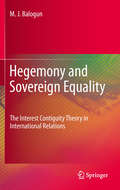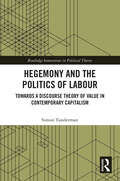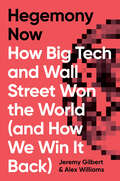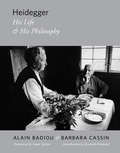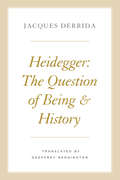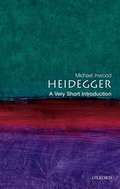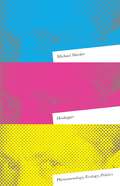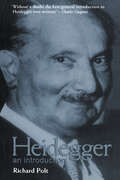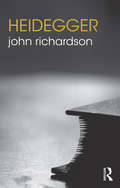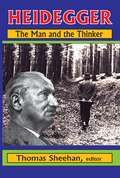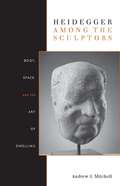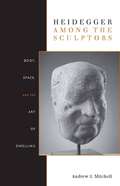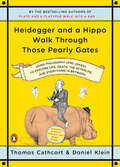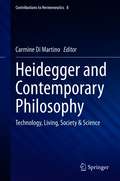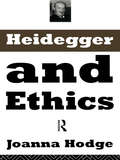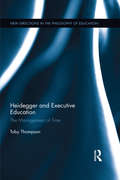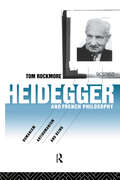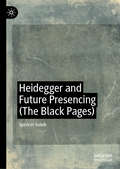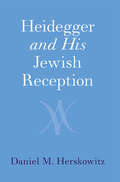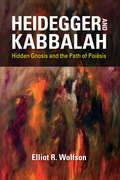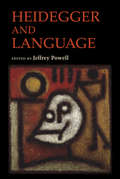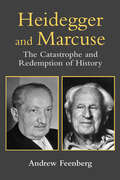- Table View
- List View
Hegemony and Sovereign Equality
by M. J. BalogunThe "interest contiguity theory," which is the book's centerpiece, holds that rather than a smooth, one-way cruise through history, humankind's journey from the inception to the present has brought him/her face to face with broadly three types of interests. The first is the individual interest, which, strange as it may sound, tends to be internally contradictory. The second is society's (or "national") interest which, due to the clash of wills, is even more difficult than personal interest to harmonize. The third is the interest espoused to justify the establishment and maintenance of supranational institutions. Though conflicting, some interests are, due to their relative closeness (or contiguity), more easily reconcilable than others. In tracing the links between and among the three broad types of interests, the book begins with a brief philosophical discussion and then proceeds to examine the implications of human knowledge for individual liberty. Against the backdrop of the epistemological and ontological questions raised in the first chapter, the book examines the contending perspectives on the theory of the state, and in particular, the circumstances under which it is justified to place the interest of society over that of the individual. The focus of the fourth chapter is on the insertion of the supranational governance constant in the sovereignty equation, and on the conflict between idealist and realist, and between both and the Kantian explanations for the new order. The adequacy or otherwise of the conflicting explanations of the change from anarchy to a 'new world order' is the subject taken up in the succeeding chapters. Besides suggesting a new analytical tool for the study of politics and international relations, the contiguity theory offers statespersons new lenses with which to capture the seismic, perplexing and sometimes disconcerting changes unfolding before their eyes.
Hegemony and the Politics of Labour: Towards a Discourse Theory of Value in Contemporary Capitalism (Routledge Innovations in Political Theory)
by Simon TundermanHegemony and the Politics of Labour takes up a question that goes to the heart of the debate about politics, capitalism, and discourse: how can labour relations and value production be understood as discursive processes? When they launched their poststructuralist discourse theory almost 40 years ago, Ernesto Laclau and Chantal Mouffe positioned the contingency of discourse and politics in sharp contrast to the deterministic tendencies of the Marxist critique of capitalism. Moving beyond Marxism as an essentialist ‘other’, discourse theory has since remained notoriously silent on questions related to the core workings of capitalism. This book is the first to bring the central categories of discourse theory into conversation with Marx’s critique of political economy. Reintegrating both traditions, it argues that the social relations of labour in capitalism emerge as a hegemonic formation. Its contribution is to extend the reach of discourse theory to the capitalist economy, exploring how a post- Marxist account of labour, value, and class connects to the contingent politics of populism. Hegemony and the Politics of Labour is an original and important contribution to the fields of discourse theory and critique of political economy.
Hegemony Now: How Big Tech and Wall Street Won the World (And How We Win it Back)
by Alex Williams Jeremy GilbertHow did we come to live in a world dominated by big tech and finance? Today power is in the hands of Wall Street and Silicon Valley. How do we understand this transformation in power? And what can we do about it? We cannot change anything until we have a better understanding of how power works, who holds it, and why that matters. Through upgrading the concept of hegemony—understanding the importance of passive consent; the complexity of political interests; and the structural force of technology—Jeremy Gilbert and Alex Williams offer us an updated theory of power for the twenty-first century. Hegemony Now explores how these forces came to control our world. The authors show how they have shaped the direction of politics and government as well as the neoliberal economy to benefit their own interests. However, this dominance is under threat. Following the 2008 financial crisis, a new order emerged in which the digital platform is the central new technology of both production and power. This offers new opportunities for counter hegemonic strategies to win back power. Hegemony Now outlines a dynamic socialist strategy for the twenty-first century.
Heidegger: His Life and His Philosophy (Insurrections: Critical Studies in Religion, Politics, and Culture)
by Alain Badiou Barbara CassinMartin Heidegger was an ordinary Nazi and a loyal member of the provincial petty bourgeoisie. He was also a seminal thinker of the Continental tradition and one of the twentieth century's most important philosophers. How are we to make sense of this dual life? Should we factor Heidegger's domestic and political associations into our understanding of his thought, or should we treat his intellectual work independently of his abhorrent politics? How does any thinker reconcile the mundane with the ideal or the pursuit of philosophical inquiry with the demands of civic engagement?In Heidegger, Alain Badiou and Barbara Cassin immerse themselves in the philosopher's correspondence with his wife Elfride to answer these questions as they relate to Heidegger and all thinkers vulnerable to the politics of their times. They focus on Heidegger's tormented relationship with his wife, with Hannah Arendt, and with numerous other women, bringing an unusual level of intimacy to his personal and intellectual worlds.
Heidegger: The Question of Being and History
by Geoffrey Bennington Jacques DerridaFew philosophers held greater fascination for Jacques Derrida than Martin Heidegger, and in this book we get an extended look at Derrida's first real encounters with him. Delivered over nine sessions in 1964 and 1965 at the École Normale Supérieure, these lectures offer a glimpse of the young Derrida first coming to terms with the German philosopher and his magnum opus, Being and Time. They provide not only crucial insight into the gestation of some of Derrida's primary conceptual concerns--indeed, it is here that he first uses, with some hesitation, the word "deconstruction"--but an analysis of Being and Time that is of extraordinary value to readers of Heidegger or anyone interested in modern philosophy. Derrida performs an almost surgical reading of the notoriously difficult text, marrying pedagogical clarity with patient rigor and acting as a lucid guide through the thickets of Heidegger's prose. At this time in intellectual history, Heidegger was still somewhat unfamiliar to French readers, and Being and Time had only been partially translated into French. Here Derrida mostly uses his own translations, giving his own reading of Heidegger that directly challenges the French existential reception initiated earlier by Sartre. He focuses especially on Heidegger's Destruktion (which Derrida would translate both into "solicitation" and "deconstruction") of the history of ontology, and indeed of ontology as such, concentrating on passages that call for a rethinking of the place of history in the question of being, and developing a radical account of the place of metaphoricity in Heidegger's thinking. This is a rare window onto Derrida's formative years, and in it we can already see the philosopher we've come to recognize--one characterized by a bravura of exegesis and an inventiveness of thought that are particularly and singularly his.
Heidegger: A Very Short Introduction
by Michael InwoodMartin Heidegger (1889-1976) is probably the most divisive philosopher of the twentieth century: viewed by some as a charlatan and by others as a leader and central figure of modern philosophy. Michael Inwood's lucid introduction to Heidegger's thought focuses on his most important work, "Being and Time," and its major themes of existence in the world, inauthenticity, guilt, destiny, truth, and the nature of time. These themes are then reassessed in the light of Heidegger's later work, together with the extent of his philosophical importance and influence. This is an invaluable guide to the complex and voluminous thought of a major twentieth-century existentialist philosopher.
Heidegger: Phenomenology, Ecology, Politics
by Michael MarderUnderstanding the political and ecological implications of Heidegger’s work without ignoring his noxious public engagements The most controversial philosopher of the twentieth century, Martin Heidegger has influenced generations of intellectuals even as his involvement with Nazism and blatant anti-Semitism, made even clearer after the publication of his Black Notebooks, have recently prompted some to discard his contributions entirely. For Michael Marder, Heidegger’s thought remains critical for interpretations of contemporary politics and our relation to the natural environment.Bringing together and reframing more than a decade of Marder’s work on Heidegger, this volume questions the wholesale rejection of Heidegger, arguing that dismissive readings of his project overlook the fact that it is impossible to grasp without appreciating his lifelong commitment to phenomenology and that Heidegger’s anti-Semitism is an aberration in his still-relevant ecological and political thought, rather than a defining characteristic. Through close readings of Heidegger’s books and seminars, along with writings by other key phenomenologists and political philosophers, Marder contends that neither Heidegger’s politics nor his reflections on ecology should be considered in isolation from his phenomenology. By demonstrating the codetermination of his phenomenological, ecological, and political thinking, Marder accounts for Heidegger’s failures without either justifying them or suggesting that they invalidate his philosophical endeavor as a whole.
Heidegger: An Introduction (New Heidegger Research Ser.)
by Richard PoltHeidegger is a classic introduction to Heidegger's notoriously difficult work. Truly accessible, it combines clarity of exposition with an authoritative handling of the subject-matter. Richard Polt has written a work that will become the standard text for students looking to understand one of the century's greatest minds.
Heidegger (The Routledge Philosophers)
by John RichardsonMartin Heidegger is one of the twentieth century’s most influential, but also most cryptic and controversial philosophers. His early fusion of phenomenology with existentialism inspired Sartre and many others, and his later critique of modern rationality inspired Derrida and still others. This introduction covers the whole of Heidegger’s thought and is ideal for anyone coming to his work for the first time. John Richardson centres his account on Heidegger’s persistent effort to change the very kind of understanding or truth we seek. Beginning with an overview of Heidegger’s life and work, he sketches the development of Heidegger’s thought up to the publication of Being and Time. He shows how that book takes up Husserl’s method of phenomenology and adapts it. He then introduces and assesses the key arguments of Being and Time under three headings—pragmatism, existentialism, and temporality—its three levels of analysis of human experience. Subsequent chapters introduce Heidegger’s later philosophy, including his turn towards a historical account of being, and new ideas about how we need to ‘think’ to get the truth about it; his influential writings on language, art, and poetry, and their role in the Western history of being; and his claim that this history has culminated in a technological relation to things that is deeply problematic, above all in the way it excludes the divine. The final chapter looks at Heidegger’s profound influence on several intellectual movements ranging from phenomenology to existentialism to postmodernism. A much-needed and refreshing introduction to this major figure, Heidegger is ideal reading for anyone coming to his work for the first time and will interest and stimulate students and scholars alike.
Heidegger: His Life and His Philosophy
by Susan Spitzer Kenneth Reinhard Alain Badiou Barbara CassinMartin Heidegger was an ordinary Nazi and a loyal member of the provincial petty bourgeoisie. He was also a seminal thinker of the Continental tradition and one of the twentieth century's most important philosophers. How are we to make sense of this mix? Should we factor Heidegger's domestic and political associations into our understanding of his thought, or should we treat his intellectual work independently of his abhorrent politics? How does any thinker reconcile the mundane with the ideal, or the pursuit of philosophical inquiry with the demands of civic engagement?In Heidegger, Alain Badiou and Barbara Cassin immerse themselves in the philosopher's correspondence to answer these questions as they relate to Heidegger and all thinkers vulnerable to their times. They focus on Heidegger's tormented relationship with his wife, Elfrida, Hannah Arendt, and numerous other women, bringing an unusual level of intimacy to his personal and intellectual worlds.
Heidegger: The Man and the Thinker (New Heidegger Research Ser.)
by Sheehan ThomasMany people consider Martin Heidegger the most important German philosopher of the twentieth century. He is indisputably controversial and influential. Athough much has been written about Heidegger, this may be the best single volume covering his life, career, and thought. For all its breadth and complexity, Heidegger's perspective is quite simple: he is concerned with the meaning of Being as disclosure.Heidegger's life was almost as simple. He was a German professor, except for a brief but significant period in which he supported the Nazi regime. While that departure from philosophy continues to haunt his name and work, one must question whether his thought from 1912 to 1976 should be measured by the yardstick of his politics from May, 1933, through February, 1934. Th is anthology addresses his complex but simple thought and his simple but complex life.In a real sense, Sheehan claims, there is no content to Heidegger's topic and legacy, only a method. But method must not be taken to mean a technique or procedure for philosophical thinking. Rather, the topic of Heidegger's thought and his pursuit of that topic, the "what" and the "how," are one and the same thing.Heidegger writes, "Alles ist Weg," "Everything is way," and man's Being is to be on-the-way in essential movement. Heidegger, argues in our essence we humans are the topic and the point is not to be led there so much as to come to know what we already know and to become what we already are. This brilliant collection confirms this truism, and is an excellent introduction to the work of this seminal thinker.
Heidegger Among the Sculptors
by Andrew MitchellIn the 1950s and 60s, Martin Heidegger turned to sculpture to rethink the relationship between bodies and space and the role of art in our lives. In his texts on the subject-a catalog contribution for an Ernst Barlach exhibition, a speech at a gallery opening for Bernhard Heiliger, a lecture on bas-relief depictions of Athena, and a collaboration with Eduardo Chillida--he formulates his later aesthetic theory, a thinking of relationality. Against a traditional view of space as an empty container for discrete bodies, these writings understand the body as already beyond itself in a world of relations and conceive of space as a material medium of relational contact. Sculpture shows us how we belong to the world, a world in the midst of a technological process of uprooting and homelessness. Heidegger suggests how we can still find room to dwell therein. Filled with illustrations of works that Heidegger encountered or considered, Heidegger Among the Sculptors makes a singular contribution to the philosophy of sculpture.
Heidegger among the Sculptors: Body, Space, and the Art of Dwelling
by Andrew J. MitchellMartin Heidegger turned to sculpture to rethink the relationship between bodies and space and the role of art in our lives. In his texts on the subject, a catalog contribution for an Ernst Barlach exhibition, a speech at a gallery opening for Bernhard Heiliger, a lecture on bas-relief depictions of Athena, and a collaboration with Eduardo Chillidahe formulates his later aesthetic theory, a thinking of relationality.
Heidegger and a Hippo Walk Through Those Pearly Gates: Using Philosophy (and Jokes!) to Explore Life, Death, the Afterlife, and Everything in Between
by Thomas CathcartFrom the authors of the bestselling Plato and a Platypus Walk into a Bar, an uproarious new book on the meaning of death (and life, too) The new book by the bestselling authors of Plato and a Platypus Walk Into a Bar is a hilarious take on the philosophy, theology, and psychology of mortality and immortality. That is, Death. The authors pry open the coffin lid on this one, looking at the Big D and also its prequel, Life, and its sequel, the Hereafter. Philosophers such as Schopenhauer, Nietzsche, Camus, and Sartre have been wrestling with the meaning of death for as long as they have been wrestling with the meaning of life. Fortunately, humorists have been keeping pace with the major thinkers by creating gags about dying. Death’s funny that way—it gets everybody’s attention. Death has gotten a bad rap. It’s time to take a closer look at what the Deep Thinkers have to say on the subject, and there are no better guides than Cathcart and Klein. .
Heidegger and Contemporary Philosophy: Technology, Living, Society & Science (Contributions to Hermeneutics #8)
by Carmine Di MartinoThis text illuminates the relevance and importance of Heidegger’s thought today. The chapters address the modern living conditions of intense social transformation intertwined with the continuous and rapid development of technologies that redefine the borders between nations and cultures. Technology globalizes markets, customs, the exchange of information, and economic flows but also – as Heidegger reminds us – revolutionizes the way we relate to bodies, to life, and to earth, by way of introducing both unprecedented opportunities and great dangers.
Heidegger and Ethics
by Joanna HodgeHeidegger and ethics is a contentious conjunction of terms. Martin Heidegger himself rejected the notion of ethics, while his endorsement of Nazism is widely seen as unethical. This major new study examines the complex and controversial issues involved in bringing them together.By working backwards through his work, from his 1964 claim that philosophy has been completed to Being and Time, his first major work, Joanna Hodge questions Heidegger's denial that his enquires were concerned with ethics. She discovers a form of ethics in Heidegger's thinking which elucidates his important distinction between metaphysics and philosophy. Against many contemporary views, she proposes therefore that ethics can be retrieved and questions the relation between ethics and metaphysics that Heidegger had made so pervasive.
Heidegger and Executive Education: The Management of Time (New Directions in the Philosophy of Education)
by Toby ThompsonGlobal corporations and the senior executives who oversee them have been subject to great criticism in recent times: not only do such corporations hold extreme concentrations of wealth, but they continue to sanction staggering pay inequalities between the haves and the have-nots. At the same time, university-based business schools are conducting programmes of executive education seemingly customised to sanction these same inequalities. Heidegger and Executive Education is a piece of critical philosophy that has been written from within the business school in order to examine how this sheltered process of educating in-role corporate executives operates. Thompson claims that executive education is based on a very simple premise: that an executive executes an order, and that executive education is an amelioration of that process. Thompson argues that the easiest way to conceive of executive education is to treat order and execution as cognates, as a single conceptual entity. Thus, he asks, if educating executives in line with the order-execution cognate involves swapping the boardroom for the classroom, and in keeping with the ‘critical’ tag, shouldn’t executive education be about questioning not only the execution, but also the dominant order? The author uses ‘time’ as the philosophical method by which one can undo the order-execution cognate, question the sanctity of the cognate and thereby halt the seemingly inexorable temporal sequence from order through to those orders becoming executed. This book uses Martin Heidegger’s exotic philosophy of time in order to mount a philosophical challenge to the temporal sequentiality of executive education. It will therefore be of great interest to academics, researchers and postgraduates who are interested in Heidegger, the philosophy of education and executive education. It should also be essential reading for those involved in training, developing, and educating corporate executives.
Heidegger and French Philosophy: Humanism, Antihumanism and Being
by Tom RockmoreMartin Heidegger's impact on contemporary thought is important and controversial. However in France, the influence of this German philosopher is such that contemporary French thought cannot be properly understood without reference to Heidegger and his extraordinary influence. Tom Rockmore examines the reception of Heidegger's thought in France. He argues that in the period after the Second World War, due to the peculiar nature of the humanist French Philosophical tradition, Heidegger became the master thinker of French philosophy. Perhaps most importantly, he contends that this reception - first as philosophical anthropology and later as postmetaphysical humanism - is systematically mistaken.
Heidegger and Future Presencing (The Black Pages)
by Spencer GolubThis book applies Heidegger’s writings to experimental fictions and film genres in order to study a being-there that performs itself beyond liveness and a future that is already here. Theatrical mise-en-scène is analyzed as a way of modeling the Heideggerian ontological-existential, exchanging a deeper presencing for the fictional “now” of liveness. The book is organized around ostensible objects that are in fact things-as-such and performs its theme via time-traveling, interruptions, decompositions, incompleteness, failure, geometric patterning, and above all black pages first cited in Tristram Shandy. This is a nuanced, original work that combines unexpected sources with even more unexpected writing, imagery, and correspondences. It is part of Golub’s ongoing project of lyrically reimagining philosophy and the mise-en-scène of theatrical performance (a presence-room of consciousness) in light of one another.
Heidegger and his Anglo-American Reception: A Comprehensive Approach (Contributions to Phenomenology #119)
by John Rogove Pietro D’OrianoThis book presents both a historical overview of the absorption of Heidegger’s thought into English-language philosophical schools as well as a philosophical discussion of his thought provided by contemporary scholars. The text describes the ways in which a philosophical methodology and worldview seemingly so inhospitable to Anglophone academia has managed to find an unlikely home.This volume is roughly divided into two types of contributions: discussions of Heidegger’s reception in the English-speaking world, and outstanding examples of English-language Heidegger scholarship. The first type includes both historiographical accounts of the encounters between Heidegger’s thought and the Anglo-American world, as well as their philosophical expositions and critiques. The second group of chapters reveal the latest contemporary scholarship by contemporary Heideggerians writing in English. It is moreover the first volume to bring together thinkers from both genealogies of Anglo-American Heideggerianism appealing to students and researchers working in both of these camps.
Heidegger and His Jewish Reception
by Daniel M. HerskowitzIn this book, Daniel Herskowitz examines the rich, intense, and persistent Jewish engagement with one of the most important and controversial modern philosophers, Martin Heidegger. Contextualizing this encounter within wider intellectual, cultural, and political contexts, he outlines the main patterns and the diverse Jewish responses to Heidegger. Herskowitz shows that through a dialectic of attraction and repulsion, Jewish thinkers developed a version of Jewishness that sought to offer the way out of the overall crisis plaguing their world, which was embodied, as they saw it, in Heidegger's life and thought. Neither turning a blind eye to Heidegger's anti-Semitism nor using it as an excuse for ignoring his philosophy, they wrestled with his existential analytic and what they took to be its religious, ethical, and political failings. Ironically, Heidegger's thought proved itself to be fertile ground for re-conceptualizing what it means to be Jewish in the modern world.
Heidegger and Homecoming
by Robert MugerauerMartin Heidegger's philosophical works devoted themselves to challenging previously held ontological notions of what constitutes "being," and much of his work focused on how beings interact within particular spatial locations. Frequently, Heidegger used the motifs of homelessness and homecoming in order to express such spatial interactions, and despite early and continued recognition of the importance of homelessness and homecoming, this is the first sustained study of these motifs in his later works. Utilizing both literary and philosophical analysis, Heidegger and Homecoming reveals the deep figural unity of the German philosopher's writings, by exploring not only these homecoming and homelessness motifs, but also the six distinctive voices that structure the apparent disorder of his works. In this illuminating and comprehensive study, Robert Mugerauer argues that these motifs and Heidegger's many voices are required to overcome and replace conventional and linear methods of logic and representation. Making use of material that has been both neglected and yet to be translated into English, Heidegger and Homecoming explains the elaborate means with which Heidegger proposed that humans are able to open themselves to others, while at the same time preserve their self-identity.
Heidegger and Kabbalah: Hidden Gnosis and the Path of Poiēsis (New Jewish Philosophy and Thought)
by Elliot R. WolfsonWhile many scholars have noted Martin Heidegger’s indebtedness to Christian mystical sources, as well as his affinity with Taoism and Buddhism, Elliot R. Wolfson expands connections between Heidegger’s thought and kabbalistic material. By arguing that the Jewish esoteric tradition impacted Heidegger, Wolfson presents an alternative way of understanding the history of Western philosophy. Wolfson’s comparison between Heidegger and kabbalah sheds light on key concepts such as hermeneutics, temporality, language, and being and nothingness, while yielding surprising reflections on their common philosophical ground. Given Heidegger’s involvement with National Socialism and his use of antisemitic language, these innovative readings are all the more remarkable for their juxtaposition of incongruent fields of discourse. Wolfson’s entanglement with Heidegger and kabbalah not only enhances understandings of both but, more profoundly, serves as an ethical corrective to their respective ethnocentrism and essentialism. Wolfson masterfully illustrates the redemptive capacity of thought to illuminate common ground in seemingly disparate philosophical traditions.
Heidegger and Language
by Jeffrey PowellThe essays collected in this volume take a new look at the role of language in the thought of Martin Heidegger to reassess its significance for contemporary philosophy. They consider such topics as Heidegger's engagement with the Greeks, expression in language, poetry, the language of art and politics, and the question of truth. Heidegger left his unique stamp on language, giving it its own force and shape, especially with reference to concepts such as Dasein, understanding, and attunement, which have a distinctive place in his philosophy.
Heidegger and Marcuse: The Catastrophe and Redemption of History
by Andrew FeenbergFirst published in 2005. Routledge is an imprint of Taylor & Francis, an informa company.
